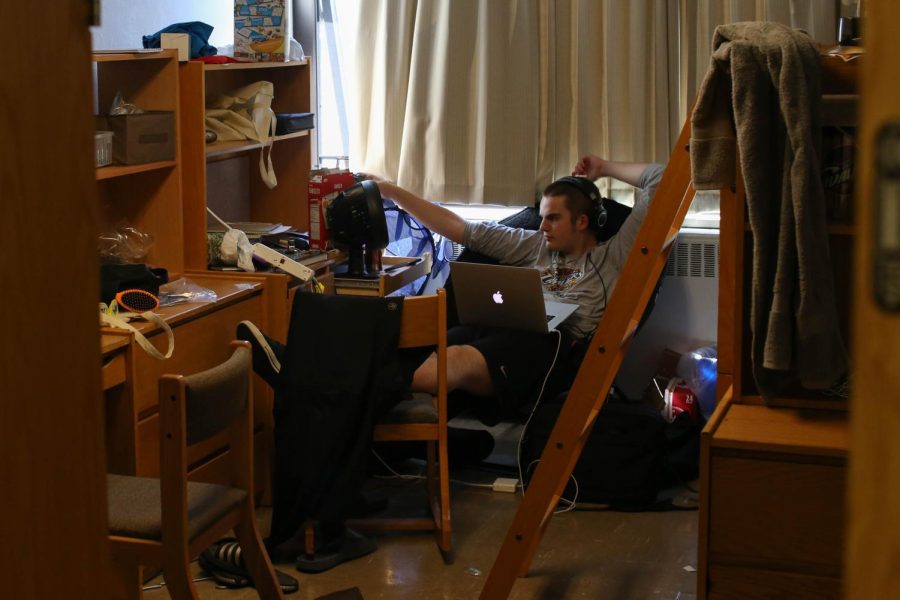Do’s and dont’s while living in residence halls
Freshman digital media production major Kyle Metzger watches a movie on his laptop in Olson Hall on Wednesday, Sept. 16, 2015.
September 16, 2015
Students moving into the residence halls for the first time know many of the written rules, but there is way more unwritten rules you may not know about.
It is important for first-time students to get acquainted with their room and its environment quickly and effectively. Nonetheless, here are three things students should and should not do when moving into the residence halls for the first time.
Do: Communicate effectively with roommates and neighbors
Communication is part of everyday life at college, and students need to be effective in their conversing methods. College students should not only be talking to others, but they should be having substantial conversations about topics or issues that might arise.
“Communication is key for any relationship, whether it is with a roommate, a friend or an intimate relationship,” said Meghan Miller, residence hall director of Stopher and Johnson halls.
Things as important as guest policies and noise levels, all the way down to music preference and other basic interests should be discussed to ensure a healthy relationship.
“I think noise is a higher complaint that I hear about, and sometimes, the students do not address it,” Miller said. “They do not go and talk to their neighbor or talk to their roommate about the noise, which then perpetuates the issue.”
In the case of getting to know a random roommate, Evan Gilmore, a freshman hospitality management major, said to find common ground and build on it using icebreakers as a starting point.
Do not: Neglect simple tasks and mandatory items
This may go without saying, but for some first-time students, college can be a whirlwind of opportunity. Still, it is important that students follow basic instructions.
“I wish all first-year students or students moving into the residence halls for the first time would read the hallway’s handbook as well as sign saying that they will uphold those policies,” Miller said.
There are many other basic rules.
“Obviously, students have to follow quiet hours and maintain a clean living space,” Gilmore said. “Also, students need to attend their floor meetings, as it not only is required, but also helps build relationships with others on the floor.”
Do: Know the room
Most students are moving from the comfort of their own homes into rooms that they must share with at least one other person. Not only does that mean the space will be smaller, but the items provided will be varied.
“When choosing a dorm room, it is very important to know the size of your room and what is included so you can plan accordingly,” Gilmore said.
Do not: Bring kitchen equipment into the room
All students, except those living in Engleman Hall, are given a “microfridge” in their room, which consists of a microwave oven as well as a mini-refrigerator with a freezer section, according to Kent State’s housing website.
Students are also not permitted to bring additional microwaves or fridges into their room, as well as items such as toaster ovens or Foreman Grills.
“Everyone that lives in one of the residence halls has a meal plan, so I am a little surprised when I see things like the George Foreman coming in,” Miller said.
Do: Utilize one’s Resident Assistant (RA) and Residence Hall Director (RHD)
Resident Assistants and Residence Hall Directors play a very important role in each residence hall that many students may not understand when moving in for the first time.
“The RA’s go through intensive training, so if there is any issue that a student might have, they can always go to one,” Miller said. “If RA’s are not able to fix the problem, they are at least able to walk a student to the office or direct them to a resource that will be able to assist them.”
More benefits can be gained from speaking with the RHD. When asked what she helps students with the most, Miller mentioned life skills.
“There is a lot of learning that occurs outside of the classroom, and sometimes students just need a little guidance or assistance with what that might be,” said Miller. “Getting involved with student organizations is, in my opinion, key to being successful here at Kent State. Students are obviously going to have classes, but I think being involved or being invested in some way, whether it is in the residence halls or on campus with a club or organization, is really important.”
Do not: Rearrange one’s room until getting approval from an RA
Students are given lofting guidelines when they move in, and they are available online, according to Kent State’s housing website.
However, that is not the only thing students should worry about, as there are other restrictions that will be documented when RA’s or other faculty check each student’s room for fire and safety hazards.
For example, according to the Fire Safety Room Inspection Form, students cannot, amongst other things, have items attached or hanging from the ceiling.
“I would recommend waiting to rearrange your room until an RA approves what changes you have made,” Gilmore said. “It saves a lot of hassle and time by making sure everything you want to move is allowed.”
Ryan Landolph is the residence hall reporter for The Kent Stater. He can be contacted at [email protected].

















